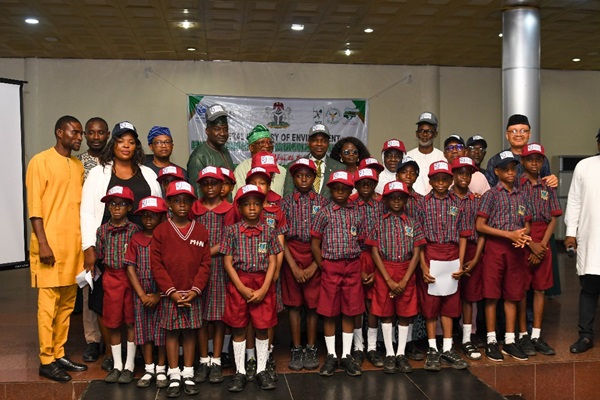
The Nigerian government has called on its over 200 million citizens to plant 10 trees each year as a measure to combat desertification and drought.
This initiative was announced by the Minister of State for Environment, Iziaq Adekunle Salako during his keynote address to commemorate the 2024 World Desertification and Drought Day in Abuja.
Salako described this tree-planting initiative as a critical step towards restoring degraded lands, combating desertification, and building resilience against drought. He emphasised that this reforestation drive is crucial for Nigeria to meet its land degradation neutrality (LDN) target by 2030.
Earlier in his address, the Minister praised President Tinubu’s dedication to addressing Nigeria’s environmental challenges, including pollution, climate change and biodiversity loss. This commitment was demonstrated by the President’s approval of a memo to ban single-use plastics across all government ministries, departments and agencies (MDAs).
Salako highlighted that this significant policy shift, complemented by other initiatives like mass mobilisation for reforestation, forms a vital part of the government’s comprehensive strategy for plastic waste management and land restoration. This strategy aims to address the intertwined challenges of climate change, biodiversity loss and pollution. “This initiative demonstrates our commitment to addressing the triple threat of climate change, biodiversity loss, and pollution,” Salako remarked, underscoring the severity of plastic pollution in Nigeria.
The Federal Government is particularly concerned about the disruption of the ecological system caused by poor land use and uncontrolled mining activities, leading to severe land degradation. To tackle this, the government has adopted regional programmes such as the Great Green Wall Sahel Sahara Initiative (GGWSSI), the African Forest Restoration (AFR100) program, and the Land Degradation Neutrality initiative. These programmes aim to provide long-term solutions to desertification, land degradation and drought.
In his welcome address, the permanent secretary of the Environment Ministry, Mallam Mahmud Kambari reiterated the urgent need for behavioural change to restore degraded lands and mitigate drought. He pointed out that actions such as developing and conducting production activities in harmony with nature and avoiding over-cultivation, bush burning, over-grazing and other unsustainable land practices are crucial.
Kambari stressed that land restoration is a collective responsibility, as everyone depends on the land. He called on states and local governments, community-based organisations, and citizens from all walks of life to unite to halt the degradation of Nigeria’s limited land resources. He urged citizens to work together to restore and rehabilitate the country’s degraded land in the face of an increasing population and the impacts of climate change, ensuring sustainable growth and development for future generations.
The high-level event, convened under the theme “United for Land: Our Legacy, Our Future,” saw diverse participants from the environment sector, including representatives from the World Bank, UNDP, Energy Commission of Nigeria, NESREA and ACReSAL.
Globally, June 17 marks the United Nations’ World Day to Combat Desertification and Drought. This day highlights the urgent need to halt land degradation through global cooperation and innovative solutions.

